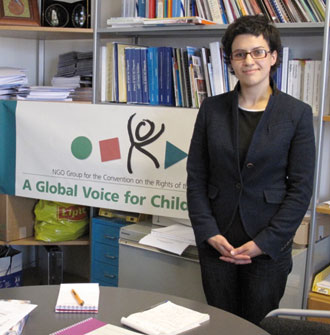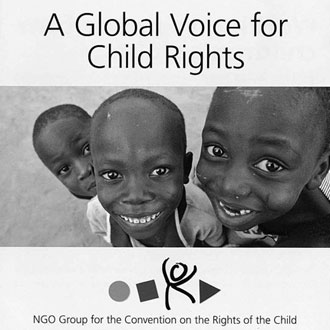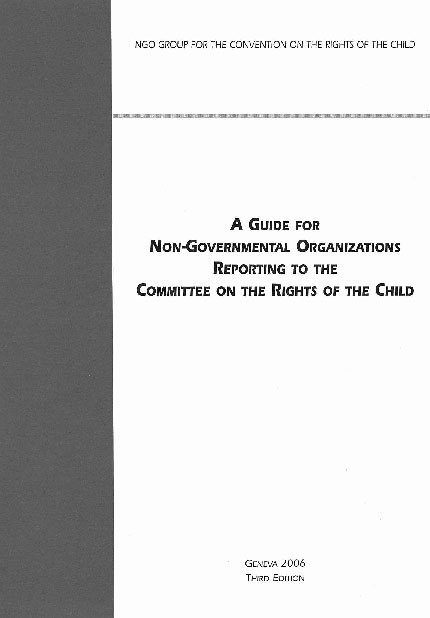
|
 |
 |
|
|
|
|
|
|
|
|
|
|
|
|
|
|
|
|
|
|
|
|
|
|
Shushan Khachyan:Our Organization is the Main Link with the Committee on the Rights of the ChildThe NGO Group for the Convention on the Rights of the Child (CRC) works with independent NGOs and national child rights coalitions in any country that has ratified the Convention on the Rights of the Child and/or its Optional Protocols (OPs). It supports national NGOs and coalitions from over 160 countries in reporting on CRC and its OPs. The organisation has developed leading expertise in the work of the UN Committee on the Rights of the Child and the monitoring of the Convention. BHRM met Ms. Shushan Khachyan, the child rights officer at the NGO Group for the CRC, at her office in Geneva. Here is the outcome of the meeting. Q. What are the procedures you follow with regards to promoting the rights of the child? All States parties to the Convention have to submit regular reports to the Committee on how the rights of children are being observed in their countries. States must report initially two years after acceding to the Convention and then every five years. The Committee is composed of 18 independent experts (4 Committee members are from the Middle East and North Africa) who meet in Geneva to examine the progress made by States and address their concerns and recommendations in the form of “concluding observations”. In order to obtain a more complete picture of children's rights in the country, the Committee seeks written information from other sources, such as NGOs, inter-governmental organisations and National Human Rigths Institutions (NHRIs). Any complementary information received by the Committee is reviewed during the pre-sessional working group meeting. The Committee invites certain NGOs, UN agencies and NHRIs who have submitted information to present their views during this meeting. The Committee then prepares a list of issues to be submitted to the government for their responses and invites them to answer the questions and comments during the plenary session. At the end of the dialogue, the Committee prepares concluding observations which reflect the main concerns and issues. The States parties then have to take appropriate legislative, administrative and policy measures to implement the recommendations. The role of NGOs is crucial in advocating and lobbying with their governments to follow up Committee's recommendations requiring specific follow-up action at the national level.
Q. What is the relationship of your NGO with the UN CRC? In 1983, 20 NGOs formed an Ad Hoc Group for the drafting of the Convention to ensure a comprehensive treaty on child rights. This led to the first international human rights treaty for children, the UN Convention on the Rights of the Child (CRC). Over the years we have become the main link between national and international NGOs and the Committee, mainly by supporting NGOs in the reporting and follow up process as well as making NGO voice influential in child rights developments both at national and international levels. In addition to assisting NGOs in effectively presenting their views to the Committee, we ensure NGO participation in the Days of General Discussion, General Comments, elections of the Committee members and sub-regional workshops. Q. What is the role of your NGO in this process? We assist NGOs throughout the reporting process by informing them about the reporting obligations of their State party, advising them on how to get involved with the UN human rights system, providing them with training, technical assistance and advice. We have built strong partnership with NGOs in different regions across Africa, Americas, Asia, Europe and Oceania. In the Middle East we have worked with NGOs in Jordan, Egypt, Lebanon, Iraq and Iran by supporting NGO initiatives in preparing reports as well as building national NGO coalitions. Q. What kind of technical assistance NGOs can expect?
We offer NGOs our expertise on how to prepare NGO reports, build national NGO coalitions and follow-up Committee's concluding observations either in the form of trainings or by various communication means. We provide financial assistance to NGOs to participate in the pre-session working group in Geneva to explain their perspective on child rights. We also provide NGOs with practical tools, guides and fact-sheets on children's rights. The countries scheduled to be examined by the Committee in the near future are Qatar, Egypt, Bahrain and Syrian Arab Republic and we would like to invite NGOs and national coalitions in the Middle East to contribute to the reporting process by submitting information on the main areas of concern with respect to children in their countries, and constructively engage in dialogue with the Committee. This will complement the efforts of their governments towards promoting and protecting the best interests of children in the country. For more information they can contact us by email khachyan@childrightsnet.org by phone +41 22 740 4730 or by visiting our website: www.childrightsnet.org. Q. How can NGOs benefit from this process? By submitting information about the main issues of concern in their countries and by taking part in the reporting process, NGOs will get involved in high-profile advocacy work at international level and can influence the country's agenda on the promotion of children's rights at national level. It is of particular importance to the Committee to receive supplementary information to the State party report on the situation of children from national human rights institutions and NGOs. By highlighting the main issues of concern as well as making recommendations towards improving the situation, NGOs will make a valuable input in drafting the recommendations addressed to their government. We would like to draw your attention to the fact that the information will be treated confidentially and will be available only to the Committee's experts. The NGOs will have an opportunity to meet the Committee experts during the pre-session working group meeting and discuss the main issues with them directly thus influencing the questions to be addressed to their government. We would like to use this opportunity to call upon NGOs in the Middle East to get involved in the global discussions on child rights in the UN human rights system. We look forward to receiving requests for information and collaboration with the NGOs in the Middle East and North Africa. |


